India is witnessing a radical transformation where highly qualified youngsters are giving up cushy jobs to make a difference in the lives of poor people in rural areas.
Manu A B/Rediff.com tracks the success stories of some of the remarkable people who are working in remote villages to change the profile of rural India.
Earlier stories
Parth Gupta quit a good corporate job to work for the welfare of farmers and empowerment of women in rural Madhya Pradesh.
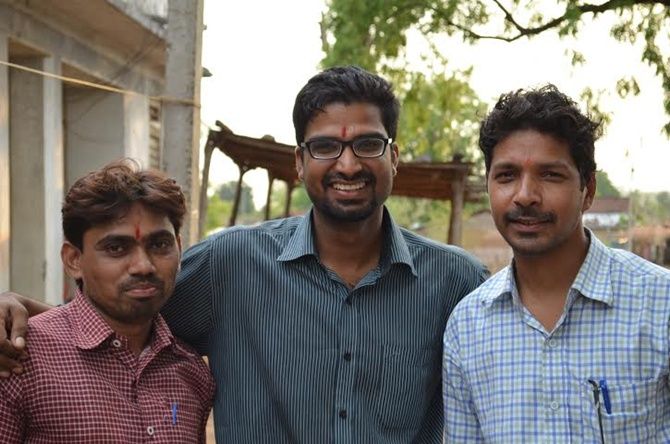
The farmers in remote villages of Madhya Pradesh, who for years have been exploited by middlemen have to thank to their wives for transforming their lives.
In a unique initiative - led by Parth Gupta - that could well serve as a model for villages across the country, womenfolk of villages have come together to form a co-operative society, which has found profitable retail markets to sell the farm produce cultivated by their husbands and relatives.
Another interesting fact is that 11-member team who manages the finances of the cooperative society are also women from the village.
The society will also assist illiterate women in starting basic things like a bank accounts.

“Starting a bank account for women like Kapoori Bai was just the basic thing. They feel that they are empowered and get a better deal for their farm produce,” says Parth Gupta, who quit a lucrative career and has been guiding the villagers to set up this co-operative society.
Today, women like Kapoori Bai who had lost all hopes in life can look up to a better future. Her widow pension was held up for many years because she did not even know whom to approach to start a bank account. Now she is happy to have received her first pension.
Partha says many of them had tried in vain to open an account; even the banks treated them badly as they were poor people with just little savings.
Kapoori Bai hails from Paretha, a remote village in Madhya Pradesh.
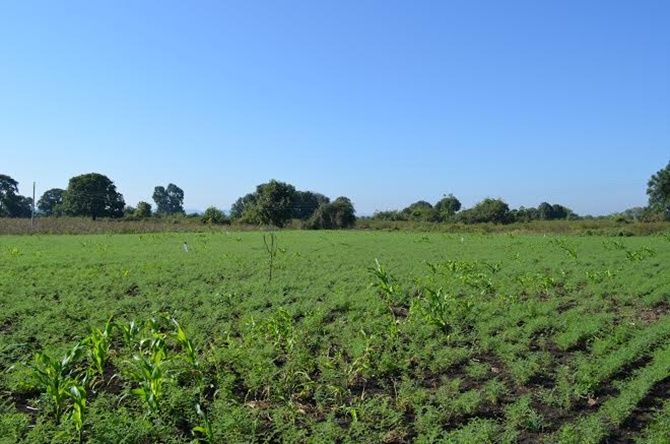
Paretha in many ways symbolises what rural India is all about: poor, desolate and lost in the mire of corrupt and incompetent establishment.
Despite the fact that the land here is very fertile and the farmers have been reaping a good harvest in their modest farmlands almost every year, they have not been able to sell their farm produce even for a reasonable profit, be it dal or vegetables with middlemen procuring stocks for cheap prices and selling it for huge profits in the cities.
But now thanks to the initiatives of Parth Gupta, the villagers can begin to hope for a better tomorrow.
Under Parth Gupta’s guidance, farmers from 32 villages across remote Madhya Pradesh have come together to begin a unique cooperative society where they will be able to sell their farm produce directly to the retail markets, cutting down the monopoly of middlemen.
The farmers have begun selling dal, their home produce directly to the co-operative society. The society then processes, packages and sells it to the market at higher rates, ensuring them good profits.
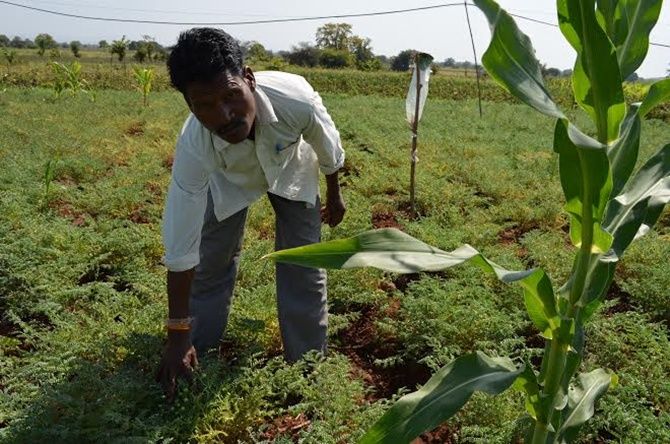 For Parth Gupta, who did his electrical engineering from BITS, Pilani this stint in rural India has been a transformative experience and makes him feel that he doing something really worthwhile that brings smiles and joy into the lives of poor folks, who have been at the receiving end of the establishment.
For Parth Gupta, who did his electrical engineering from BITS, Pilani this stint in rural India has been a transformative experience and makes him feel that he doing something really worthwhile that brings smiles and joy into the lives of poor folks, who have been at the receiving end of the establishment.
After a year of working as a business analyst for Polaris Financial Technologies, he realized that the job was not what he wanted to do. “I wanted to do something more meaningful in life and give back to the society. I realised that as we grow up we become more risk averse so I decided to take risk though my parents opposed my move, I decided to follow my passion and take up the SBI fellowship,” says 25-year-old Parth Gupta.
He says thousands of farmers are reeling under huge debt across these villages.
“The farmers in the villages are unaware about their rights. They do not have access to new technologies. They do not know how to get the right price for their hard-earned yield. I found that farmers were selling their produce to the outside market at cheaper rates as they needed money for their daily needs and later buying the same thing at a higher cost. I wanted to put in place a system where this ridiculous practice ended,” says 25-year-old Parth Gupta.
With the support of the NGO AKRSP(I), Parth is mobilising a strong group of 1,500 women who can make farming and marketing of the farm products more lucrative.
 Currently, farmers have to travel a distance of 20-30 kilometres in bullock carts to sell their products in the nearest market, that too at cheap prices.
Currently, farmers have to travel a distance of 20-30 kilometres in bullock carts to sell their products in the nearest market, that too at cheap prices.
The co-operative society will save them the drudgery of travelling long distances and fetch them a better price as well.
Though there was an institution in the name of a farmers' federation in place, It has been dormant since its inception.
Parth’s relentless work in reviving these groups has yielded positive results with farmers coming forward with their produce through the cooperative society. 
The society for farmers will be an all-women initiative.
“Efforts are on in full swing to add more farmers to this network. We have already started a processing and selling unit where dal is collected from the villages, it is then processed and packaged to get better price. So farmers get a reasonable price for their products. We plan to start with dal and then move to other products like vegetables. The federation of 1,500 women from self help groups will be linked to the government’s scheme called Small Farmers Agriculture Consortium (SFAC) to give their products better linkage with the market,” explains Parth.
Here farmers’ income is just Rs 3,000-4,000 a month. Once the cooperative starts functioning fully, an average family can save atleast Rs 3,000 to 5000 every year, says Parth.
 Since it is linked to SFAC, farmers will also get a steady source of seeds and agriculture equipment at subsidized prices. The co-operative has also tied up with schools who will be supplied dal used for the midday meals.
Since it is linked to SFAC, farmers will also get a steady source of seeds and agriculture equipment at subsidized prices. The co-operative has also tied up with schools who will be supplied dal used for the midday meals.
Work is also on to build a one-stop kirana store; where the villagers can buy everything they need at subsidised rates rather than depending on small stores that offer low quality products at higher prices.
It’s been a roller coaster ride for Parth who has been patiently striving to garner more support from farmers. It has been a daunting task to convince farmers to agree to sell their produce to the co-operative society.
“Small farmers are often cheated by farmers who own larger tracts of land and by middlemen who make huge profits in the process. Our efforts are to end this exploitation of poor farmers. Once the co-operative starts functioning fully, farmers can be assured of better prices for all their products and incase they need to buy it for their own use, they will get it at a subsidised rates as well. However, many farmers are not too convinced and it is challenge to make them understand that these plans will make their life better, says Parth.
Parth who had a different concept about villages and the people in rural areas is touched by their simple yet inspiring gestures.
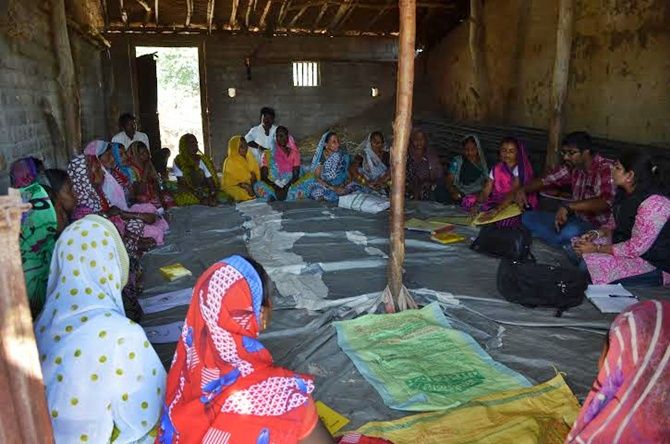 “When I visited Vimla Bai’s house, she made makkai roti and ghee. Having ghee is a luxury here. Though she did not have it for herself or her family members, she ensured that I had a good meal. It was really a touching moment for me. Living in the village has been a great learning experience,” says Parth Gupta, who went against his parents’ wishes to work the village.
“When I visited Vimla Bai’s house, she made makkai roti and ghee. Having ghee is a luxury here. Though she did not have it for herself or her family members, she ensured that I had a good meal. It was really a touching moment for me. Living in the village has been a great learning experience,” says Parth Gupta, who went against his parents’ wishes to work the village.
There are about 150 self help groups across the 32 villages but there was no data on the members. Parth has made a directory with details of all the members and their identity proofs as well.
Going forward, Parth Gupta wants to train young and unskilled youngsters in rural India and give them employment.
“Unemployment is the main reason for majority of the problems in India. Though we have a large population of educated people, it is difficult to find people who are skilled to do a job. My focus will be to start an enterprise where I can offer employment to thousands of unemployed youth. Technical skill development is the need of the hour. A good majority of the graduates in our country have no skill sets. So there is a huge talent gap which needs to be bridged to build a better India,” says Parth.
To know more about Parth Gupta’s work, you can mail him at parthguptaeng@gmail.com
If you wish to join the movement to bring about a change in rural India or would like to contribute in any way, you can send a mail to shuvajit@youthforindia.org










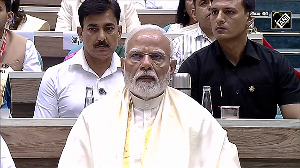
 © 2025
© 2025